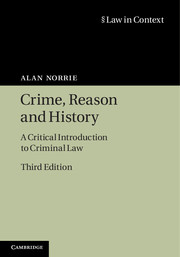Book contents
- Frontmatter
- Dedication
- Contents
- Preface to the third edition
- Preface to the second edition
- Preface to the first edition
- Table of cases
- Table of statutes
- Prologue: A brief history of the ancient juridical city of Fictionopolis
- Part I Context
- Part II Mens rea
- 3 Motive and intention
- 4 Recklessness
- 5 Strict and corporate liability
- Part III Actus reus
- Part IV Defences
- Part V Concluding
- Bibliography
- Index
4 - Recklessness
Published online by Cambridge University Press: 05 October 2014
- Frontmatter
- Dedication
- Contents
- Preface to the third edition
- Preface to the second edition
- Preface to the first edition
- Table of cases
- Table of statutes
- Prologue: A brief history of the ancient juridical city of Fictionopolis
- Part I Context
- Part II Mens rea
- 3 Motive and intention
- 4 Recklessness
- 5 Strict and corporate liability
- Part III Actus reus
- Part IV Defences
- Part V Concluding
- Bibliography
- Index
Summary
The language of the general part suffers distortion and manipulation, because the contemporary state of criminal law theory is ambivalent about the role of blame and condemnatory judgment in the criminal law. Descriptive theorists seek to minimise the normative content of the criminal law in order to render it, in their view, precise and free from the passions of subjective moral judgment … [Such a concern] may impel courts and theorists towards value free rules and concepts; the reality of judgment, blame and punishment generates the contrary pressure and insures that the quest for a value free science of law cannot succeed.
(Fletcher, 1978, 400–1)In almost every case which I heard … litigants and witnesses, whether they lied or were mistaken, worked with the same moral and legal rules as the judges did. This is the mark of a homogeneous society; and it alone allows a satisfactory process of law. If the litigants have rules of rightdoing different from those of the judges, the judges can punish them, but not convict them.
(Gluckman, 1963, 182)Introduction
Just as we have examined the contradictions and tensions within the law of intention, so we now repeat the task in relation to the other main form of mens rea, recklessness. Just as with intention, we will find that the law has had difficulty in achieving ‘clear and consistent definitions of words expressing its basic concepts’ (Williams, 1983, 73). As with intention, the law was consolidated and returned to a seemingly less conflicted state after twenty years of difficulty; yet the underlying problems may not have been resolved in this area either.
Between 1981 and the House of Lords’ decision in Caldwell and 2003 when it reversed itself in G and another, recklessness had two distinct and opposed meanings within the law. It could involve either doing an act and recognising that there is a risk that it may result in harm being caused, or doing an act without recognising the risk where that risk would be obvious to a reasonable onlooker. The ensuing problem was that while most common law offences and their statutory successors could be committed with the first, narrower, mental state, only some could be committed according to both forms, and there was no rhyme or reason as to their employment. Smith and Hogan (1999, 67) described the law prior to G and another as ‘indefensible’.
- Type
- Chapter
- Information
- Crime, Reason and HistoryA Critical Introduction to Criminal Law, pp. 73 - 101Publisher: Cambridge University PressPrint publication year: 2014



